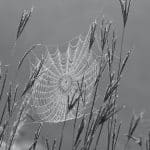approx 1300 words, ~8 min read time
The flock lands in my garden on a frozen winter morning, a solemn cloud of sharp beaks and grey feathers. They haunt the branches of the apple tree and congregate like sparrows waiting for seeds. But the birds are not of this land or sky. They are special guests—family—and they have travelled a long way.
I slip into my boots and sheepskin coat, grab a bucket of feed, and step into the cold. Their obsidian eyes follow my every movement. I fill the feeders with dried mealworms, crushed peanuts, and black-oil sunflower seeds.
“Go ahead,” I say, my breath painting ghosts in the air.
The birds need no encouragement. The winter feast is why they’ve come. An ancient tradition. They each find a morsel and peck, peck, peck. Most winter birds faced with a meal like this would be happily chirping and fluttering, but the soulbirds dine as they did in life, in revered silence. My aunts, uncles, cousins—their feathers a soft pale grey akin to mourning doves. My tiny sisters—their storm-dark feathers not yet worn light and translucent by eternity and long travel between realms. Heaven and earth.
Oh, Ida and Edda! How I hated leaving you behind. The hardest thing I’ve ever done. But no matter how much I wanted, I couldn’t take you with me when I escaped the Blessed Village. You were too small, the journey too long and arduous. Deep down, I hoped one day you’d find me. Yet I could never have imagined a reunion crueller than this.
When I heard the news, I didn’t want to believe it. Everyone at the Village dead. Nothing and no one survived the fire. The flames swallowed every building, including the church. I have a feeling I’d be dead, too, had I stayed.
I reach out my hand. Ida lands on my fingers, weighing no more than a psalm. She grabs a sunflower seed, spooks off, and chips away at it on a snowy branch. Edda observes me longer before braving the same. She stays for a moment. Sunlight catches her feathers. I hold my breath, resisting the urge to close my fingers around her and bring her indoors, where it’s cosy and warm. But to trap and keep her in a cage? I could never do it to her soul.
I breathe in. Out. A phantom summer scents the air, as if somewhere under the snow, wildflowers are blooming. Above, citrus trees, which do not grow here.
For the rest of the day, I make myself quiet, useful, needed, as if I were still serving the church and the village. It feels natural, almost frighteningly easy, unlike the life I’ve tried so hard to build here, but never quite feeling like I belong. With family, at least, I always knew my place and what to do, how to give.
Keeping my head down, I refill the feeders, over and over, hoping it’s enough.
It’s the least I can do for my sisters.
#
I can’t help but wonder… If I didn’t feed the flock, where would they go? No one to feed them at the Village anymore.
Last winter, a mob of chickadees slipped into my neighbour’s barn and attacked his sheep. The birds pecked the sheep’s backs bloody to reach the fat under the skin. Another year, the same happened to the udders of his cows. Both times, the animals were so badly injured they had to be put down.
Would chickadees really do that?
My neighbour no longer keeps animals, but I hear they have a new baby in the house. A little girl.
#
The weary winter sun sinks below the horizon, leaving behind a thickening blue dusk. The flock swirls in the air, assembling into the shape of a giant cross, before disappearing into the night. It’s my turn to be the one left behind.
A flock of one.
#
I wake to the sound of scratching—on the roof, in the walls. The flock should be long gone, but I hear it, the scratching and the digging, the skin of the house crawling around me. I pull the bed covers over my head. It could be rats.
Or chickadees.
I hope it’s rats.
It happens with small birds all the time, once the temperatures start dropping—they get curious about houses. Some say the birds are looking for hibernating insects within gaps and air vents, that’s how they get stuck inside the walls. They burrow deeper and deeper into woolly insulation, and with no light to guide them, they never find their way out. Others say they’re just seeking warmth.
An old house like this has many holes. Not that it matters. The dead always find a way in.
Something flutters across the room.
I click the bedside lamp on. Batlike shadows slash the walls, the visitors perched at the foot of my bed, winged and waiting.
The rest of the flock has arrived late, the majority of them more distant relatives and ancestors, perhaps, but family nonetheless. Those who had farther to go. All the way from hell. It takes me a moment to recognise my parents and the elders among them. Their wicked feathers look dull and frayed. The air smells faintly of tar, sulphur, smoke.
I push away the covers and slip out of bed, bare feet landing on the cold pine floor. The birds follow me to the kitchen. I open the fridge, assessing its contents, only to close it soon after—the birds won’t accept processed food. Back in the Village, we led a simple life, only ate what we traded or grew. The birds cock their heads, watching me with dead, glassy eyes.
I find the near-empty bucket and throw a handful of sunflower hearts in the air. They rain against the floorboards. The birds swoop down and peck, but it’s not enough. I feel a sickening twist in my stomach. Of shame, failure, regret. I should’ve prepared better, should’ve known the rest of my family would find me too. Instead, I’ve spent the morning being far too generous.
“I’m sorry. It’s all I’ve got.”
The birds glare at me, quiet judgement in their stare.
I know hunger when I see it.
In my mind, I see my father giving sermons and working the fields; my mother sweeping, cooking, and sacrificing so much. Both my parents dedicated their whole lives to family, discipline, and God—and raised me to do the same. Or the house would hum with the sacred hymn of holy whip and divine belt. My escape was the only time I ever stood up to them, the only way I knew how, and now they’re here. And hungry.
I hear their voices in my head. Ungrateful girl. Haven’t I always had soup in my bowl, a clean dress, and a roof over my head? Haven’t I? Haven’t I? Even now my fridge is full. Of brand foods and forbidden delights.
I take a step backwards. The birds knit closer. Older generations always were well-mannered, although less so behind closed doors where God couldn’t see.
Greedy girl. Selfish girl. The voices in my head drown out my own. If I ever had one. To not share of my lot would be a sin. The guests are my family. My flesh, blood, and feathers. My community. And I am theirs.
I pull my nightgown over my head, baring my breasts, stomach, soft thighs. I climb the chair and lay myself down on the kitchen table. I think of the neighbour’s baby girl sleeping in her cot, so safe and so loved. Her whole life ahead of her. I bite my tongue, hoping not to wake her. I close my eyes, but even through shut eyelids, I see the torn wings gathering above. The ravenous beaks.
Family should not go hungry, not when I have so much to give.
Sylvia Heike (she/her) is a speculative fiction writer from Finland. Her stories have appeared in Flash Fiction Online, PodCastle, Nature Futures, and more. When not writing, she likes to go hiking and looking for birds. Find her online at sylviaheike.com or on Twitter
@sylviaheike.






